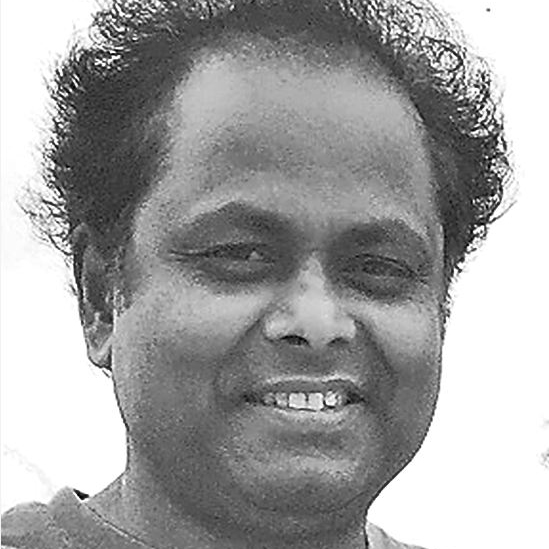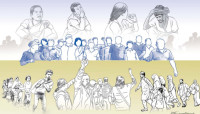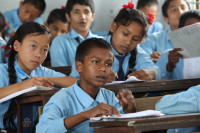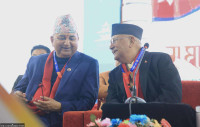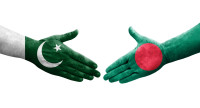Opinion
Years of writing
When I look back, I find my columns polemic, especially after the failure of the first Constituent Assembly
Pramod Mishra
When I began writing a regular column in March 2009 for this newspaper, I intended to bring a fresh and complex perspective to the vibrant public discourse on the prospective constitution. The very discursive air evinced incredible excitement and hope on the ground. Because of my multidisciplinary education and multilingual, multicultural, multi-regional, multinational background, I believed I could contribute to the conversation about a common future for us all in a new Nepal. And I thought that once a progressive, just and pluralist constitution gets written, I will write only occasionally thereafter.
Balanced approach
As I look back, I find that my initial pieces reflected the imprint of my professional training in literary studies. I interpreted contemporary events as literary pieces—a poem, a narrative, a work of art—and my job was to ‘deep read’ them in order to unpack their meanings through the lens of critical and cultural theory. I also followed the rhetorical path of raising an issue adequately, offering counter-arguments and concessions to opposing views while supporting my stance with reason and reliable evidence.
I never sided with either the extreme right or the extreme left; I saw value in a balanced, complex approach to issues about constitution writing. I saw, and I still see, both merits and flaws in the liberal and left ideologies, and in positions the hill high castes, the Madhesis and the Janajati parties and organisations take in public. For example, in more than one column on the Madhes and the Madhesis, I took the leaders to task for their short-sightedness and factionalism and criticised the social ills in Madhes while admiring the richness of its culture and cuisine and the Madhesis’ endurance in the face of centuries of marginalisation. I valued Nepal’s independence while debunking and exposing sham in narrow nationalism whether that be of the Maoists and the left, the sports fans or the right-wingers.
Nobody’s cheerleader
On the issue of ethnicity, identity and federalism, I argued for a balanced, negotiated approach. For example, when the Maoists travelled to various places in the country and declared ethnic states unilaterally, I argued (‘Don’t gift ethnic federalism,’ December 23, 2009) that nobody could gift federalism to the people of Nepal as if they were the palace bestowing a constitution. Only a hard-fought, intensely-negotiated constitution, which is identity inclusive, could be an actual constitution for the country. Similarly, when the Maoists were transitioning into a democratic party, I compared the Young Communist League vandalism with that of the Blackshirt Fascist gangs in Mussolini’s Italy, even as I sympathised with their leaders’ internal struggle to resolve their ideological differences between theory and practice, peace and violence. My goal in writing about the Maoists was to endorse their transformative potential and discourage and frighten their hardliners. It was because at that time, it was clear that the Maoists—dominated by hardliners until the Rookmangud Katwal fiasco—were not sincere about democracy and quite serious about the forcible takeover of the state.
I must admit that the CPN-UML and Nepali Congress have received more blame than praise from me. While striving for balance and complexity, as a writer, I do not believe in being an equal opportunity blamer or admirer. I am nobody’s cheerleader, especially not of those who believe state power is their inheritance and birthright. Groupthink suffocates me; extreme individualism bores me. I believe that only pluralism, which recognises multiple identities, will usher in equal opportunity, guarantee individual rights and protect groups
from tyrants.
Polemic tendencies
When I look back on the last six years of columns, I find that the early deep reading of events has given way to polemic tendencies, especially after the failure of the first Constituent Assembly (CA) to draft the constitution. My tone turned a bit incendiary at times. Instead of chuckling at the foibles of KP Oli like English essayist Joseph Addison, my pen tended to draw blood like Jonathan Swift. I have become more and more critical of the UML and Congress than before and more and more supportive of the Maoists, Madhesis and the Janajatis. And I find this troubling, because, when justice and pluralism become the sole charge of a single group or a party or of one side in an extremely diverse society, the future does not bode well. That is why, before the CA II elections, I wished that nobody got a damning (two-thirds) majority. When it happened in favour of the UML and Congress, I saw trouble. And trouble it has been since, made worse with Oli’s election as chair of the UML and the Congress’s supporting the Oli line.
The situation has come to a point where someone from the hill high castes (and this includes a relative of mine as well) who once refused to attend a Khas or Chhetri association meeting, now happily leads a ‘topi’ rally, such as the Democracy Day parade of Nepali officialdom, which failed to celebrate the country’s heterogeneity. The ‘Dhoti’ rally is not far behind—as we saw recently on the day of UCPN (Maoist)-led opposition show of strength in Kathmandu—even though the participants of the‘dhoti’ rally looked disheveled and ragamuffin, displaying imprints of historical neglect and discrimination.
Through consensus
In the midst of this bleak political landscape, a silver lining has emerged in the form of growing voices of wisdom in the Congress and civil society. More and more people are speaking out for negotiation and for bringing all the stakeholders onboard. The international community, too, has become thick-skinned and stood for balance, moderation, and consensus.
One hopes that balance and tough negotiation will prevail and a constitution will emerge out of this dialogic churning rather than monologic boycott or process, because loss of balance and prevalence of extremism are not imaginary musings. They have ruined country after country, poisoned one society after another in South Asia, the Middle East and northern Africa.




 13.12°C Kathmandu
13.12°C Kathmandu